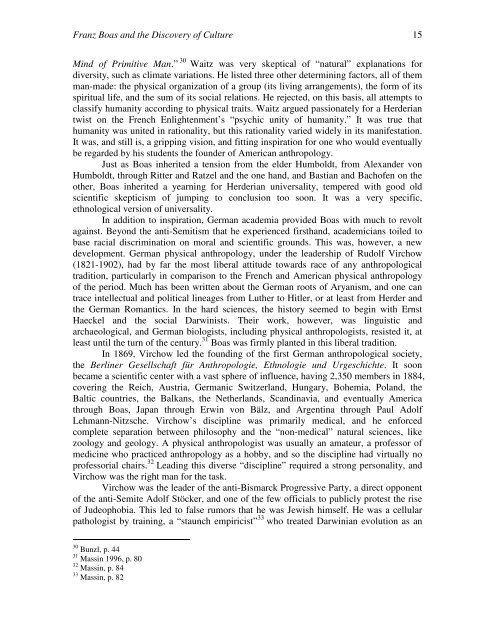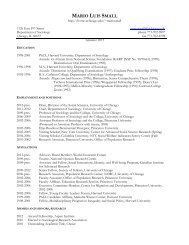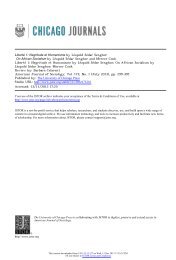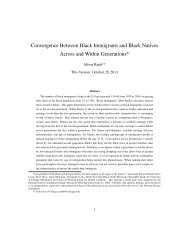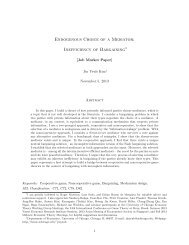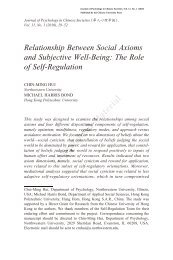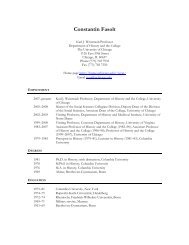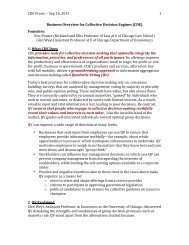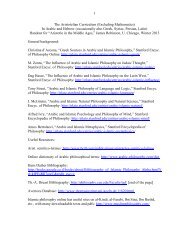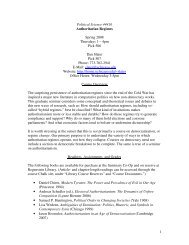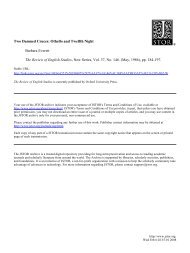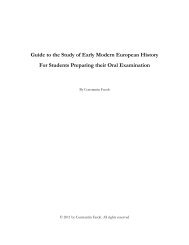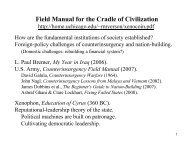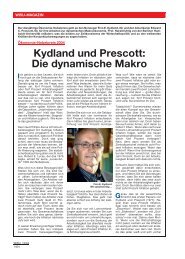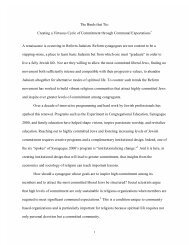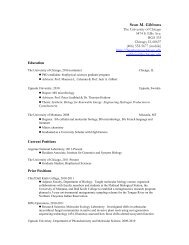Franz Boas and the Discovery of Culture - Personal Web Pages ...
Franz Boas and the Discovery of Culture - Personal Web Pages ...
Franz Boas and the Discovery of Culture - Personal Web Pages ...
Create successful ePaper yourself
Turn your PDF publications into a flip-book with our unique Google optimized e-Paper software.
<strong>Franz</strong> <strong>Boas</strong> <strong>and</strong> <strong>the</strong> <strong>Discovery</strong> <strong>of</strong> <strong>Culture</strong> 15<br />
Mind <strong>of</strong> Primitive Man.” 30 Waitz was very skeptical <strong>of</strong> “natural” explanations for<br />
diversity, such as climate variations. He listed three o<strong>the</strong>r determining factors, all <strong>of</strong> <strong>the</strong>m<br />
man-made: <strong>the</strong> physical organization <strong>of</strong> a group (its living arrangements), <strong>the</strong> form <strong>of</strong> its<br />
spiritual life, <strong>and</strong> <strong>the</strong> sum <strong>of</strong> its social relations. He rejected, on this basis, all attempts to<br />
classify humanity according to physical traits. Waitz argued passionately for a Herderian<br />
twist on <strong>the</strong> French Enlightenment’s “psychic unity <strong>of</strong> humanity.” It was true that<br />
humanity was united in rationality, but this rationality varied widely in its manifestation.<br />
It was, <strong>and</strong> still is, a gripping vision, <strong>and</strong> fitting inspiration for one who would eventually<br />
be regarded by his students <strong>the</strong> founder <strong>of</strong> American anthropology.<br />
Just as <strong>Boas</strong> inherited a tension from <strong>the</strong> elder Humboldt, from Alex<strong>and</strong>er von<br />
Humboldt, through Ritter <strong>and</strong> Ratzel <strong>and</strong> <strong>the</strong> one h<strong>and</strong>, <strong>and</strong> Bastian <strong>and</strong> Bach<strong>of</strong>en on <strong>the</strong><br />
o<strong>the</strong>r, <strong>Boas</strong> inherited a yearning for Herderian universality, tempered with good old<br />
scientific skepticism <strong>of</strong> jumping to conclusion too soon. It was a very specific,<br />
ethnological version <strong>of</strong> universality.<br />
In addition to inspiration, German academia provided <strong>Boas</strong> with much to revolt<br />
against. Beyond <strong>the</strong> anti-Semitism that he experienced firsth<strong>and</strong>, academicians toiled to<br />
base racial discrimination on moral <strong>and</strong> scientific grounds. This was, however, a new<br />
development. German physical anthropology, under <strong>the</strong> leadership <strong>of</strong> Rudolf Virchow<br />
(1821-1902), had by far <strong>the</strong> most liberal attitude towards race <strong>of</strong> any anthropological<br />
tradition, particularly in comparison to <strong>the</strong> French <strong>and</strong> American physical anthropology<br />
<strong>of</strong> <strong>the</strong> period. Much has been written about <strong>the</strong> German roots <strong>of</strong> Aryanism, <strong>and</strong> one can<br />
trace intellectual <strong>and</strong> political lineages from Lu<strong>the</strong>r to Hitler, or at least from Herder <strong>and</strong><br />
<strong>the</strong> German Romantics. In <strong>the</strong> hard sciences, <strong>the</strong> history seemed to begin with Ernst<br />
Haeckel <strong>and</strong> <strong>the</strong> social Darwinists. Their work, however, was linguistic <strong>and</strong><br />
archaeological, <strong>and</strong> German biologists, including physical anthropologists, resisted it, at<br />
least until <strong>the</strong> turn <strong>of</strong> <strong>the</strong> century. 31 <strong>Boas</strong> was firmly planted in this liberal tradition.<br />
In 1869, Virchow led <strong>the</strong> founding <strong>of</strong> <strong>the</strong> first German anthropological society,<br />
<strong>the</strong> Berliner Gesellschaft für Anthropologie, Ethnologie und Urgeschichte. It soon<br />
became a scientific center with a vast sphere <strong>of</strong> influence, having 2,350 members in 1884,<br />
covering <strong>the</strong> Reich, Austria, Germanic Switzerl<strong>and</strong>, Hungary, Bohemia, Pol<strong>and</strong>, <strong>the</strong><br />
Baltic countries, <strong>the</strong> Balkans, <strong>the</strong> Ne<strong>the</strong>rl<strong>and</strong>s, Sc<strong>and</strong>inavia, <strong>and</strong> eventually America<br />
through <strong>Boas</strong>, Japan through Erwin von Bälz, <strong>and</strong> Argentina through Paul Adolf<br />
Lehmann-Nitzsche. Virchow’s discipline was primarily medical, <strong>and</strong> he enforced<br />
complete separation between philosophy <strong>and</strong> <strong>the</strong> “non-medical” natural sciences, like<br />
zoology <strong>and</strong> geology. A physical anthropologist was usually an amateur, a pr<strong>of</strong>essor <strong>of</strong><br />
medicine who practiced anthropology as a hobby, <strong>and</strong> so <strong>the</strong> discipline had virtually no<br />
pr<strong>of</strong>essorial chairs. 32 Leading this diverse “discipline” required a strong personality, <strong>and</strong><br />
Virchow was <strong>the</strong> right man for <strong>the</strong> task.<br />
Virchow was <strong>the</strong> leader <strong>of</strong> <strong>the</strong> anti-Bismarck Progressive Party, a direct opponent<br />
<strong>of</strong> <strong>the</strong> anti-Semite Adolf Stöcker, <strong>and</strong> one <strong>of</strong> <strong>the</strong> few <strong>of</strong>ficials to publicly protest <strong>the</strong> rise<br />
<strong>of</strong> Judeophobia. This led to false rumors that he was Jewish himself. He was a cellular<br />
pathologist by training, a “staunch empiricist” 33 who treated Darwinian evolution as an<br />
30 Bunzl, p. 44<br />
31 Massin 1996, p. 80<br />
32 Massin, p. 84<br />
33 Massin, p. 82


